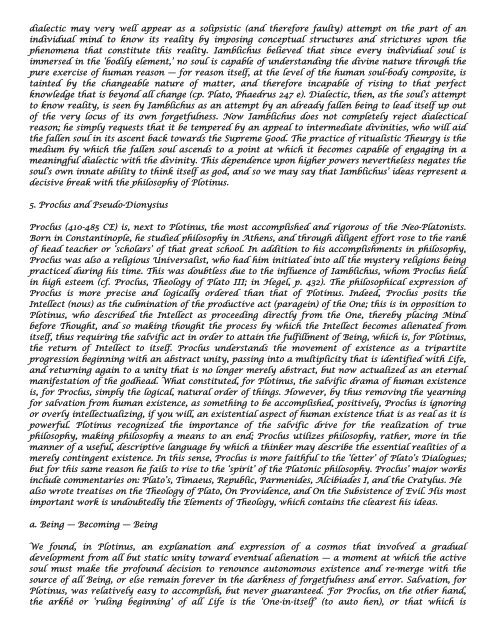Neo-Platonism - Grand Lodge Bet-El
Neo-Platonism - Grand Lodge Bet-El
Neo-Platonism - Grand Lodge Bet-El
You also want an ePaper? Increase the reach of your titles
YUMPU automatically turns print PDFs into web optimized ePapers that Google loves.
dialectic may very well appear as a solipsistic (and therefore faulty) attempt on the part of an<br />
individual mind to know its reality by imposing conceptual structures and strictures upon the<br />
phenomena that constitute this reality. Iamblichus believed that since every individual soul is<br />
immersed in the ‘bodily element,’ no soul is capable of understanding the divine nature through the<br />
pure exercise of human reason — for reason itself, at the level of the human soul-body composite, is<br />
tainted by the changeable nature of matter, and therefore incapable of rising to that perfect<br />
knowledge that is beyond all change (cp. Plato, Phaedrus 247 e). Dialectic, then, as the soul’s attempt<br />
to know reality, is seen by Iamblichus as an attempt by an already fallen being to lead itself up out<br />
of the very locus of its own forgetfulness. Now Iamblichus does not completely reject dialectical<br />
reason; he simply requests that it be tempered by an appeal to intermediate divinities, who will aid<br />
the fallen soul in its ascent back towards the Supreme Good. The practice of ritualistic Theurgy is the<br />
medium by which the fallen soul ascends to a point at which it becomes capable of engaging in a<br />
meaningful dialectic with the divinity. This dependence upon higher powers nevertheless negates the<br />
soul’s own innate ability to think itself as god, and so we may say that Iamblichus’ ideas represent a<br />
decisive break with the philosophy of Plotinus.<br />
5. Proclus and Pseudo-Dionysius<br />
Proclus (410-485 CE) is, next to Plotinus, the most accomplished and rigorous of the <strong>Neo</strong>-Platonists.<br />
Born in Constantinople, he studied philosophy in Athens, and through diligent effort rose to the rank<br />
of head teacher or ‘scholars’ of that great school. In addition to his accomplishments in philosophy,<br />
Proclus was also a religious Universalist, who had him initiated into all the mystery religions being<br />
practiced during his time. This was doubtless due to the influence of Iamblichus, whom Proclus held<br />
in high esteem (cf. Proclus, Theology of Plato III; in Hegel, p. 432). The philosophical expression of<br />
Proclus is more precise and logically ordered than that of Plotinus. Indeed, Proclus posits the<br />
Intellect (nous) as the culmination of the productive act (paragein) of the One; this is in opposition to<br />
Plotinus, who described the Intellect as proceeding directly from the One, thereby placing Mind<br />
before Thought, and so making thought the process by which the Intellect becomes alienated from<br />
itself, thus requiring the salvific act in order to attain the fulfillment of Being, which is, for Plotinus,<br />
the return of Intellect to itself. Proclus understands the movement of existence as a tripartite<br />
progression beginning with an abstract unity, passing into a multiplicity that is identified with Life,<br />
and returning again to a unity that is no longer merely abstract, but now actualized as an eternal<br />
manifestation of the godhead. What constituted, for Plotinus, the salvific drama of human existence<br />
is, for Proclus, simply the logical, natural order of things. However, by thus removing the yearning<br />
for salvation from human existence, as something to be accomplished, positively, Proclus is ignoring<br />
or overly intellectualizing, if you will, an existential aspect of human existence that is as real as it is<br />
powerful. Plotinus recognized the importance of the salvific drive for the realization of true<br />
philosophy, making philosophy a means to an end; Proclus utilizes philosophy, rather, more in the<br />
manner of a useful, descriptive language by which a thinker may describe the essential realities of a<br />
merely contingent existence. In this sense, Proclus is more faithful to the ‘letter’ of Plato’s Dialogues;<br />
but for this same reason he fails to rise to the ‘spirit’ of the Platonic philosophy. Proclus’ major works<br />
include commentaries on: Plato’s, Timaeus, Republic, Parmenides, Alcibiades I, and the Cratylus. He<br />
also wrote treatises on the Theology of Plato, On Providence, and On the Subsistence of Evil. His most<br />
important work is undoubtedly the <strong>El</strong>ements of Theology, which contains the clearest his ideas.<br />
a. Being — Becoming — Being<br />
We found, in Plotinus, an explanation and expression of a cosmos that involved a gradual<br />
development from all but static unity toward eventual alienation — a moment at which the active<br />
soul must make the profound decision to renounce autonomous existence and re-merge with the<br />
source of all Being, or else remain forever in the darkness of forgetfulness and error. Salvation, for<br />
Plotinus, was relatively easy to accomplish, but never guaranteed. For Proclus, on the other hand,<br />
the arkhê or ‘ruling beginning’ of all Life is the ‘One-in-itself’ (to auto hen), or that which is
















